祈使句变间接引语
祈使句-直接引语变间接引语

祈使句的直接引语变间接引语在第一单元中我们学习了述句和疑问句的直接引语变间接引语的用法,本期主要讲解祈使句的直接引语变间接引语的用法。
先看两个句子:1. “Put your coat in the closet,”the landlord said to him.→ The landlord asked him to put his coat in the closet.2. The father said to his children,“Don't move!”→The father to ld his children not to move.从以上两个句子可以看出:例句1是表示“请求”的口气;例句2是表示“命令”的口气。
由此看来,当我们转述祈使句时,通常将原句中的动词变为动词不定式,并在不定式的前面加上ask, order, tell等转述动词,形成三种结构:①表示邀请、请求某人做某事时用ask sb. to do sth.; ②表示叫、吩咐某人做某事时用tell sb. to do sth.; ③表示命令某人做某事时用order sb. (not) to do sth.。
例如:①She said to us, “Please have a rest.” →She asked us to have a rest.②The old man said, “Don't smoke in the hall.”→The old man told me not to smoke in the hall.③The officer said, “Go away.” →The officer ordered us to go away.注意:当祈使句的直接引语变为间接引语时,因为祈使句表示“请求”、“命令”等口气,所以祈使句直接引语变为间接引语时不存在时态的变化。
但是人称、指示代词、时间、地点状语等的变化还应根据述句直接引语变间接引语的方法进行相应的改变。
祈使句变间接引语
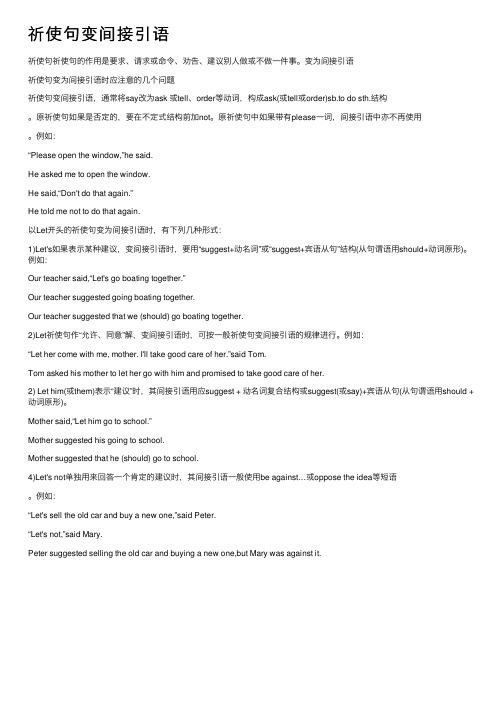
祈使句变间接引语祈使句祈使句的作⽤是要求、请求或命令、劝告、建议别⼈做或不做⼀件事。
变为间接引语祈使句变为间接引语时应注意的⼏个问题祈使句变间接引语,通常将say改为ask 或tell、order等动词,构成ask(或tell或order)sb.to do sth.结构。
原祈使句如果是否定的,要在不定式结构前加not。
原祈使句中如果带有please⼀词,间接引语中亦不再使⽤。
例如:“Please open the window,”he said.He asked me to open the window.He said,“Don't do that again.”He told me not to do that again.以Let开头的祈使句变为间接引语时,有下列⼏种形式:1)Let's如果表⽰某种建议,变间接引语时,要⽤“suggest+动名词”或“suggest+宾语从句”结构(从句谓语⽤should+动词原形)。
例如:Our teacher said,“Let's go boating together.”Our teacher suggested going boating together.Our teacher suggested that we (should) go boating together.2)Let祈使句作“允许、同意”解,变间接引语时,可按⼀般祈使句变间接引语的规律进⾏。
例如:“Let her come with me, mother. I'll take good care of her.”said Tom.Tom asked his mother to let her go with him and promised to take good care of her.2) Let him(或them)表⽰“建议”时,其间接引语⽤应suggest + 动名词复合结构或suggest(或say)+宾语从句(从句谓语⽤should +动词原形)。
直接引语与间接引语

主语从句:主语从句连接词与宾语从 句的连接词大致一样 ______ he is still alive is a wonder. That _______ it will do us harm remains to Whether be seen. _______________________ comes in first Whoever/Whichever (of you) will receive a prize. ___________ people we are to invite is still How many a question.
3.直接引语是特殊疑问句,变成间接引语时, 由相应的疑问词who, whom, whose, how, when, why, where 等引导。 My sister asked me, "How do you like the film?"→ My sister asked me how I liked the film. 4. 直接引语是祈使句,变成间接引语时, 把动词原形变成动词不定式,并在动词不定 前加tell, ask, order 等的宾语。 The captain ordered, "Be quiet." The captain ordered us to be quiet.
They mainly discussed the suggestion that (should) be built ______ a big dam _______________(build) there.
同位语从句 :它一般跟在某些名词后面, 用以说明该名词表示的具体内容。 可以跟同位语从句的名词通常有news, idea,fact,promise,thought,hope, message,suggestion,word(消息), possibility等。 question,doubt,no idea suggestion, demand, request …
直接引语变间接引语的用法

直接引语变间接引语的用法由直接引语变为间接引语,分以下情况:1、直接引语是陈述句时间接引语为that引导的宾语从句(口语中that可以省略),主句的引述动词主要有say ,tell, repeat, explain, think等。
He said, "You are younger than I.” He said (that) I was younger than him.2、直接引语是疑问句时间接引语为陈述语序:主句的谓语动词say 改为ask,或改为wonder, do not know, want to know, be not sure, be puzzled等。
(1)一般疑问句或反意疑问句变为if (whether)引导的宾语从句。
She said, "Do you often come here to read newspapers?"→She asked me if (或whether)I often went there to read newspapers.She asked me, "You have seen the film, haven’t you?"→She asked me whether(或if )I had seen the film.(2)选择疑问句变为whether….or 宾语从句。
I asked him, "Will you stay at home or go to a film tonight?"→I asked him whether he would stay at home or go to a film that night.(3)特殊疑问句变为由原来的疑问词引导的宾语从句。
He asked, "Where do you live?" →He asked me where I lived.3、直接引语是祈使句时间接引语为不定式,作ask , tell, beg, order, warn, advise等动词的宾语补足语(don’t 变为not ).The teacher said to the boy, "Open the window." →The teacher told the boy to open the window. His father said to him, “Don’t leave the door open.” →His father told him not to leave the door open.[注意](1)有些表示建议、提议、劝告或要求的祈使句,可以用suggest ,insist等动词加以转述。
祈使句的转述
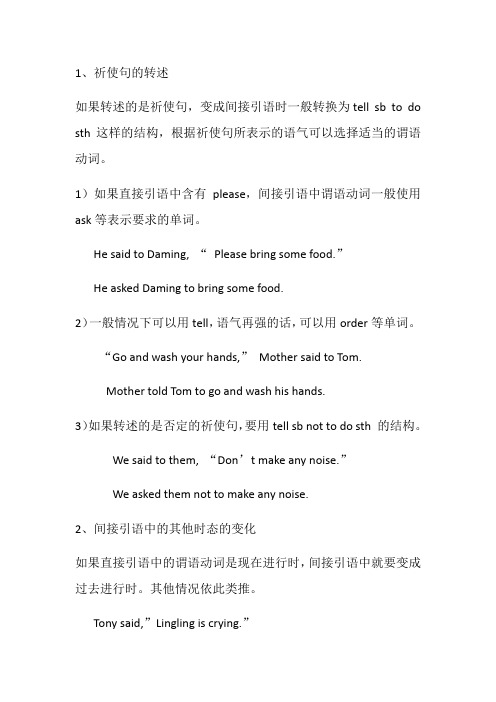
1、祈使句的转述如果转述的是祈使句,变成间接引语时一般转换为tell sb to do sth这样的结构,根据祈使句所表示的语气可以选择适当的谓语动词。
1)如果直接引语中含有please,间接引语中谓语动词一般使用ask等表示要求的单词。
He said to Daming, “Please bring some food.”He asked Daming to bring some food.2)一般情况下可以用tell,语气再强的话,可以用order等单词。
“Go and wash your hands,”Mother said to Tom.Mother told Tom to go and wash his hands.3)如果转述的是否定的祈使句,要用tell sb not to do sth 的结构。
We said to them, “Don’t make any noise.”We asked them not to make any noise.2、间接引语中的其他时态的变化如果直接引语中的谓语动词是现在进行时,间接引语中就要变成过去进行时。
其他情况依此类推。
Tony said,”Lingling is crying.”Tony said (that) Lingling was crying.如果直接引语中是一般将来时,间接引语中就要变成过去将来时。
Mary said, “I will finish my work in an hour.”Mary said (that) she would finish her work in an hour.如果直接引语中是现在完成时,间接引语中就要变成过去完成时。
Lucy said, “I have been to London.”Lucy said (that) she had been to London.3、其他直接引语如果是一般疑问句,变为间接引语时,要用连词whether 或if来引导,从句中用陈述语序。
公开课祈使句的直接引语和间接引语副本
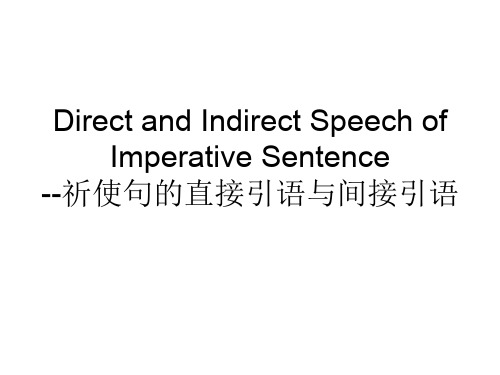
She told him not to touch anything.
直接引语如果是以“Let’s”开头的祈 使句,变为间接引语时,通常用 “suggest +动名词(或从句)。
例如: He said, "Let’s go to the film."
2) “Please don’t leave me.” she said to him. She begged him not to leave her.
3) “Please turn off the lights .”the teacher said to him.
The teacher asked him to turn off the lights.
Decide whether these sentences are command(命令) or request(请求).
• Close the door please. (request) • Get me something to drink. (comm a walk. (command) • Can you speak louder? (request) • Would you clean your room. (request)
3. “Don’t put it on my hat.” his wife said to him. His wife told him ___ put it on ___ hat. A. don’t, his B. don’t, her C. not to, his D. not to, her
Conclusion(结论)
直接引语和间接引语变化规律
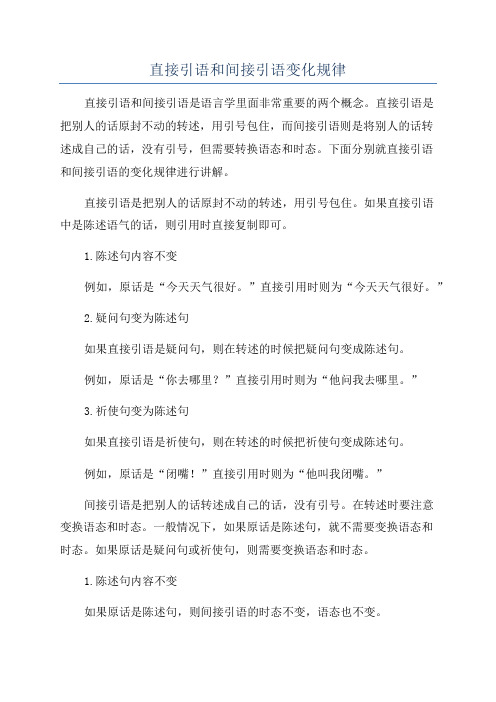
直接引语和间接引语变化规律直接引语和间接引语是语言学里面非常重要的两个概念。
直接引语是把别人的话原封不动的转述,用引号包住,而间接引语则是将别人的话转述成自己的话,没有引号,但需要转换语态和时态。
下面分别就直接引语和间接引语的变化规律进行讲解。
直接引语是把别人的话原封不动的转述,用引号包住。
如果直接引语中是陈述语气的话,则引用时直接复制即可。
1.陈述句内容不变例如,原话是“今天天气很好。
”直接引用时则为“今天天气很好。
”2.疑问句变为陈述句如果直接引语是疑问句,则在转述的时候把疑问句变成陈述句。
例如,原话是“你去哪里?”直接引用时则为“他问我去哪里。
”3.祈使句变为陈述句如果直接引语是祈使句,则在转述的时候把祈使句变成陈述句。
例如,原话是“闭嘴!”直接引用时则为“他叫我闭嘴。
”间接引语是把别人的话转述成自己的话,没有引号。
在转述时要注意变换语态和时态。
一般情况下,如果原话是陈述句,就不需要变换语态和时态。
如果原话是疑问句或祈使句,则需要变换语态和时态。
1.陈述句内容不变如果原话是陈述句,则间接引语的时态不变,语态也不变。
例如,原话是“今天天气很好。
”间接引语时则为“他说今天天气很好。
”2.疑问句变为宾语从句如果原话是疑问句,则间接引语的时态、语态和句式都要发生变化。
疑问词需要改为适当的宾语从句疑问词。
例如,原话是“你去哪里?”间接引语时则为“他问我去哪里。
”3.祈使句变为带有“叫”、“让”等动词的句子如果原话是祈使句,则间接引语要变成带有“叫”、“让”等动词的句子,同时时态和语态也要发生变化。
例如,原话是“闭嘴!”间接引语时则为“他让我闭嘴。
”总之,直接引语和间接引语的变化规律都是需要根据不同情境进行变化。
需要根据不同的语言表达方式,以及所要表达的具体意思进行判断与转换。
掌握这些规律有利于我们更加精准地表达自己的意思,使自己的语言更加自然流畅。
祈使句的直接引语变为间接引语导学案

祈使句的直接引语变为间接引语讲与练一、祈使句的直接引语变间接引语通常采用tell/ask sb (not)to do 结构。
tell sb(not )to do sth”翻译为叫某人做某事”用于表示命令祈使“ask sb (not) to do sth”翻译为“请某人做某事”,用于表示请求语气的祈使句。
1.Mother said to me , “Come back before 10:00.”Mother told me to go back before 10:00.2.The hostess said to us , “Please sit down.”The hostess asked us to sit down.3. He said, “Don’t make so much noise, boys.”He told the boys not to make so much noise.4, He said, “Please don’t talk about it any more, Jim.”He asked Jim not to talk about it any more.注意: 表示“请求一般疑问句,变为祈使句可以有两种结构。
1.“ Would you like to see my flat ?” she asked.She asked me whether I would like to see her flat or She asked me to see her flat.2.The secretary said to the woman on the phone: “Could you hold on for a minute.”________________________________or___________________________________ 二、祈使句的直接引语变间接引语根据具体语境还可以用其它引述动词,如order, warn, remind, advise,offer, suggest 等。
祈使句的直接引语变间接引语讲解
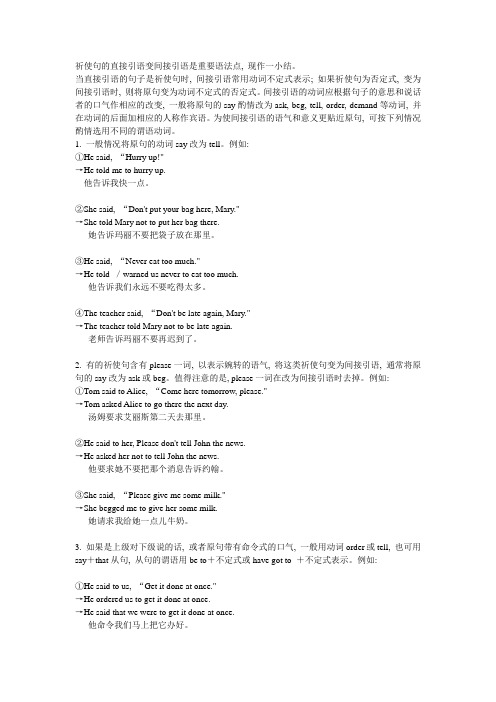
祈使句的直接引语变间接引语是重要语法点, 现作一小结。
当直接引语的句子是祈使句时, 间接引语常用动词不定式表示; 如果祈使句为否定式, 变为间接引语时, 则将原句变为动词不定式的否定式。
间接引语的动词应根据句子的意思和说话者的口气作相应的改变, 一般将原句的say酌情改为ask, beg, tell, order, demand等动词, 并在动词的后面加相应的人称作宾语。
为使间接引语的语气和意义更贴近原句, 可按下列情况酌情选用不同的谓语动词。
1. 一般情况将原句的动词say改为tell。
例如:①He said, “Hurry up!"→He told me to hurry up.他告诉我快一点。
②She said, “Don't put your bag here, Mary."→She told Mary not to put her bag there.她告诉玛丽不要把袋子放在那里。
③He said, “Never eat too much."→He told /warned us never to eat too much.他告诉我们永远不要吃得太多。
④The teacher said, “Don't be late again, Mary."→The teacher told Mary not to be late again.老师告诉玛丽不要再迟到了。
2. 有的祈使句含有please一词, 以表示婉转的语气, 将这类祈使句变为间接引语, 通常将原句的say改为ask或beg。
值得注意的是, please一词在改为间接引语时去掉。
例如:①Tom said to Alice, “Come here tomorrow, please."→Tom asked Alice to go there the next day.汤姆要求艾丽斯第二天去那里。
直接引语变间接引语其注意事项

直接引语变间接引语及其注意事项引述别人的话时,一般采用两种方式:一是引用别人的原话,把它放在引号内,称为直接引语;二是用自己的话加以转述,被转述的话不放在引号内,称为间接引语。
间接引语在大多数情况下是一个宾语从语。
直接引语变成间接引语时,要注意以下几点:人称变化、时态变化、宾语从句要用陈述句语序。
1.直接引语是陈述句,变成间接引语时,由连词that 引导。
例如:She said, "I am very happy to help you."→She said that she was very happy to help you.2. 直接引语是一般(选择/反意)疑问句,变成间接引语时,由连词whether 或if 引导。
例如:He asked me, "Do you like playing football?"→He asked me if/whether I liked playing football.注意:大多数情况下,if和whether 可以互换,但后有or not,或在动词不定式前,或放在介词后作连接词时,一般只用whether。
例如:She asked me whether he could do it or not.He hesitated about whether to drive or take the train.3. 直接引语是特殊疑问句,变成间接引语时,由相应的疑问词who, whom, whose, how, when, why, where 等引导。
例如:My sister asked me, "How do you like the film?"→My sister asked me how I liked the film.4. 直接引语是祈使句,变成间接引语时,把动词原形变成动词不定式,并在动词不定前加tell, ask, order 等的宾语。
直接引语变间接引语口诀

直接引语变间接引语口诀一、当直接引语为陈述句,变成间接引语的“顺口溜”是:去掉引号加that,人称变化要灵活,时态向后退一步,状语变化按规则。
She said,“My brother doesn't want to go there.”→She said that her brother didn't want to go there.二、当直接引语为一般疑问句,变成间接引语的“顺口溜”是:去掉引号加if,陈述语序要记住,时态人称和状语,小心变化别马虎。
I asked her,“Do you study English here?”→I asked her if she studied English there.三、当直接引语是特殊疑问句,变成间接引语的“顺口溜”是:直接去引号,陈述莫忘掉,小心助动词,丢它最重要。
“What do you want?”he asked me. →He asked me what I wanted.四、当直接引语是祈使句,变成间接引语的“顺口溜”是:去掉引号要加to, ask,tell须记住,直引若是否定式,not加在to前部。
The teacher said to her mother,“Please give me the book.” →The teacher told her mother to give her the book.五、对于人称变化,要求学生们记住的“顺口溜”是:第一人称看主语,第二人称看宾语,宾语若是不存在,活用代词I,my,me。
He said to her,“Are you interested in English?”→He a sked her if she was interested in English.The teacher said,“Where have you been?”→The teacher asked me(us) where I(we) had been.六、时态对应表:直接引语时态间接引语时态一般现在时→ 一般过去时一般将来时→ 过去将来时现在进行时→ 过去进行时一般过去时→ 过去完成时现在完成时→ 过去完成时(过去完成时时态不变)情态动词也要变成相应的过去式:can could; may might; must must/had to一般疑问句whether/if 引导的宾语从句“Is this your umbrella, Mary?” asked John.John asked Mary if that was her umbrella.特殊疑问句wh-词引导的宾语从句“Mary, when will you return John asked Mary when she wouldme the book?” asked John return him the book主句动词为一般现在时或现在完成时从句动词时态不变She often says, “All men and women She often says that all men and womenar e equal under the law.”are equal under the law.主句动词为一般过去时一般现在时一般过去时“I know it,” he said.He said that he knew it现在进行时过去进行时“I’m making coffee for you all,” she said.She said she was making coffee for us all.现在完成时过去完成时“I have seen her before,” said he. He said he had seen her before.一般过去时过去完成时“I saw her last Monday,” he said.He said he had seen her the previous Monday过去完成时过去完成时“ Do you know Rick had been ill in bed.Jack asked if I knew Rick had been ill in bedfor many days till he died?” Jack asked for many days till he died一般将来时过去将来时He said: “We shall start tomorrow He said they would start the next day由直接引语转变为间接引语,下列情况时态不变:1. 不变的真理The teacher said to the students, “Water freezes when the temperature falls below 0℃.”→ The teacher told the students that water freezes when the temperature falls below 0℃.2. 经常的习惯:He said to the doctor, “I smoke two packs every day.”→ He told the doctor that he smokes two packs every day.3. 历史事件:The teacher said, “World War Ⅱended in 1945.”→ The teacher said that World War Ⅱ ended in 1945.4. 部分情态动词,如must, ought to, used to, had better等:She said to me: “You must hurry up.”→ She said that I must hurry up.练习题;1. Jack said to me, “You look worried today.”Jack told me that ___ worried ___.A. he looks…todayB. you look…todayC. we looked…that dayD. I looked…that day2. We said to her, “They’re walking through the street now.”We told her that ___ through the street ___.A. we were walking…thenB. you are walking…nowC .they were walking…then D. they walking…now3. Mr Black said, “I have walked a long way this week.”Mr Black said that __ a long way __.A. I had walked…last wee kB. he had walked…that weekC. I walked…last weekD. he has walked…this week4. The man thought, “I shall take it back tomorrow.”The man thought that __ take it back ____.A. I shall…tomorrowB. I shall…the next dayC. he should…tomo rrowD. he wo uld …the next day5. They said to us, “Are you afraid to leave this house ?”They asked us ____ afraid to leave _____ house.A. that were we…thisB. that we were…thatC. if were we …thisD. if we were…that6. Jane said, “What did he hear about a week ago?”Jane asked ____ about _____.A. that he heard…a week ag oB. what he had heard…the week beforeC. what he had herd… a week agoD. if he heard…the week ago7. She asked, “Whose house will he break into next time ?”She asked whose house ____ break into __A. will he…next timeB. would he…the next timeC. he would…the next timeD. he will…next time8. Jack said to her, “Where do you spend your holidays?”Jack asked her where ____ holidays.A. she spent herB. you spend yourC. she spend herD. you spent your9. Black asked me, “ Why haven’t you left here yet?”Black asked me why ____ yet.A. I hadn’t left thereB. I haven’t left hereC. hadn’t I left thereD. haven’t I lef t here10. The teacher asked her, “Does the sun rise in the east ?”The teacher asked her ___ the sun ___ in the east.A. if…riseB. if…risesC. whether…roseD. whether did …rise。
祈使句变间直接引语

Very polite
1. 祈使句表命令、要求(command)
(1)“Repeat it three times ,”the teacher said to her. The teacher told her to repeat it three times.
(2)
“Don’t wait here any longer, ”he said.
Command: (of sb in a position of authority) tell sb to do sth.
Request: to ask sth or ask sb to do sth in a polite or formal way. impolite
1.Open the window. 2.Please open the window. 3. would you please open the window.
He command me not to wait there any longer.
2. 祈使句表请求(request) (1)”Give it to me, please, ”Wei Fang said to him. Wei Fang asked her to give it toe said to me, “please close the door.” He requested me to close the door.
直接引语为祈使句,变间接引语时需关注: (1)将直接引语中的动词改为动词不定式; (2)谓语动词换为tell, order, command, ask, beg, request 等; (3)时间状语、地点状语、人称及时态做相应的 改变。
直接引语变间接引语常用的有三种情况
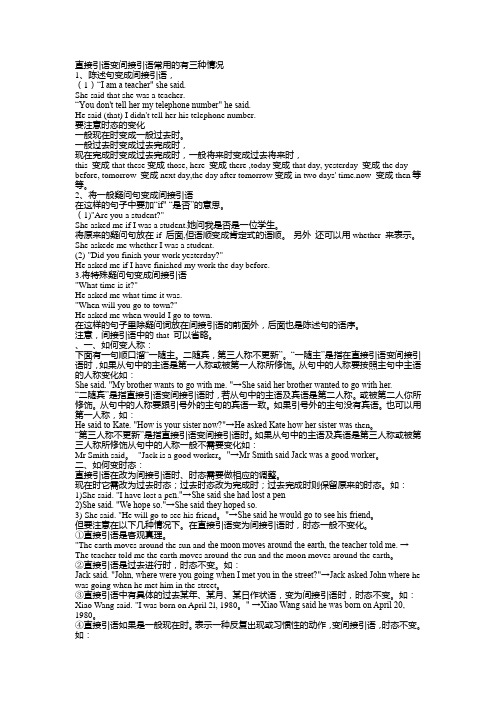
直接引语变间接引语常用的有三种情况1、陈述句变成间接引语,(1)“I am a teacher" she said.She said that she was a teacher.“You don't tell her my telephone number" he said.He said (that) I didn't tell her his telephone number.要注意时态的变化一般现在时变成一般过去时。
一般过去时变成过去完成时,现在完成时变成过去完成时,一般将来时变成过去将来时,this 变成that these变成those, here 变成there ,today变成that day, yesterday 变成the day before, tomorrow 变成next day,the day after tomorrow变成in two days' time.now 变成then 等等。
2、将一般疑问句变成间接引语在这样的句子中要加“if" “是否”的意思。
(1)"Are you a student?"She asked me if I was a student.她问我是否是一位学生。
将原来的疑问句放在if 后面,但语顺变成肯定式的语顺。
另外还可以用whether 来表示。
She askede me whether I was a student.(2) "Did you finish your work yesterday?"He asked me if I have finished my work the day before.3.将特殊疑问句变成间接引语"What time is it?"He asked me what time it was."When will you go to town?"He asked me when would I go to town.在这样的句子里除疑问词放在间接引语的前面外,后面也是陈述句的语序。
祈使句变间接引语

Homework
1. Preview Page 12-13 2.Finish off “优化方案” Page 30-40 “课时作业” Page 111-112
3.警告,提醒
warn sb (not) to do remind sb(not) to do
1.“Don't somke!” the teacher said. The teacher warned the students not to smoke. 2.“ Take the umbrlla in case of rain.” his mother said to her. Her mother warned/reminded her to take the umbrella in case of rain.
tell sb (not) to do sth
The techer said to her class,“Please have a seat.” The teacher asked her class to have a seat.
ask (not) sb to do sth
The manager said to the clerk, “Copy the document.”
The man asked his son not to plau computer games any longer.
.
5. “How fast she runs!” she said to her sister.(tell to do) She told to her sister that how fast she run.
1. 表示命令,ask /tell /order sb (not) to do sth
祈使句变间接引语
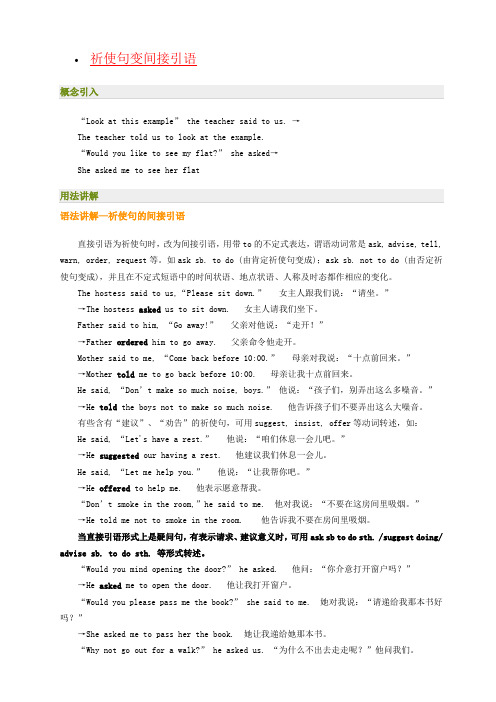
•祈使句变间接引语“Look at this example” the teacher said to us. →The teacher told us to look at the example.“Would you like to see my flat?” she asked→She asked me to see her flat语法讲解—祈使句的间接引语直接引语为祈使句时,改为间接引语,用带to的不定式表达,谓语动词常是ask, advise, tell, warn, order, request等。
如ask sb. to do (由肯定祈使句变成);ask sb. not to do (由否定祈使句变成),并且在不定式短语中的时间状语、地点状语、人称及时态都作相应的变化。
The hostess said to us,“Please sit down.”女主人跟我们说:“请坐。
”→The hostess asked us to sit down. 女主人请我们坐下。
Father said to him, “Go away!”父亲对他说:“走开!”→Father ordered him to go away. 父亲命令他走开。
Mother said to me, “Come back before 10:00.”母亲对我说:“十点前回来。
”→Mother told me to go back before 10:00. 母亲让我十点前回来。
He said, “Don’t make so much noise, boys.”他说:“孩子们,别弄出这么多噪音。
”→He told the boys not to make so much noise. 他告诉孩子们不要弄出这么大噪音。
有些含有“建议”、“劝告”的祈使句,可用suggest, insist, offer等动词转述,如:He said, “Let's have a rest.”他说:“咱们休息一会儿吧。
中考英语直接引语与间接引语转换单选题40题

中考英语直接引语与间接引语转换单选题40题1.She said, “I like apples.”A.She said that she like apples.B.She said that she liked apples.C.She said that she likes apples.答案:B。
直接引语变间接引语时,时态要相应地变化。
原句是一般现在时,变为间接引语时要变为一般过去时。
A 选项动词形式错误;C 选项时态未变。
2.He said, “I am happy.”A.He said that he am happy.B.He said that he was happy.C.He said that he is happy.答案:B。
直接引语中的am 变为间接引语时要变为was。
A 选项动词形式错误;C 选项时态未变。
3.They said, “We are students.”A.They said that they are students.B.They said that they were students.C.They said that they will be students.答案:B。
直接引语是一般现在时,变为间接引语变为一般过去时。
A 选项时态未变;C 选项时态错误。
4.She said, “I have a book.”A.She said that she have a book.C.She said that she has a book.答案:B。
直接引语中的have 变为间接引语时要变为had。
A 选项动词形式错误;C 选项时态未变。
5.He said, “I can swim.”A.He said that he can swim.B.He said that he could swim.C.He said that he will swim.答案:B。
祈使句的直接引语变间接引语

祈使句的直接引语变间接引语例如:hall."Go away.” Fhe officer ordered us to go away.注意:当祈使句的直接引语变为间接引语时,因为祈使句表⽰“请求”、“命令”等⼝⽓,所以祈使句直接引语变为间接引语时不存在时态的变化。
但是⼈称、指⽰代词、时间、地点状语等的变化还应根据陈述句直接引语变间接引语的⽅法进⾏相应的改变。
例如:doctors asked Dr. Bethune to let him go on with the op eration."Go and wash your face, Tom, ” Mother said. TMother told Tom to go and wash his face.顺便提⼀下,祈使句的间接引语变直接引语也应该遵循陈述句间接引语变直接引语的⽅法。
例如: "Giveit to me, pl ease,” Wei Fang said to him.只要同学们认真记住以上三种祈使句直接引语变间接引语的基本结构,相信同学们⼀定能学会祈使句的直接引语变间接引语。
⼩试⽜⼑:A )变下列直接引语为间接引语。
祈使句的直接引语变间接引语在第⼀单元中我们学习了陈述句和疑问句的直接引语变间接引语的⽤法,本期主要讲解祈使句的直接引语变间接引语的⽤法。
先看两个句⼦: 1. “Put your coat in the closet, put his coat in the closet. ” the landlord said to him. The landlord asked him to move. 2. The father said to his children, Don't move! ”T The father t old his children not to 从以上两个句⼦可以看出:例句 1是表⽰“请求”的⼝⽓;例句 2是表⽰“命令”的⼝⽓。
直接引语变间接引语及其注意事项

引述别人的话时,一般采用两种方式:一是引用别人的原话,把它放在引号内,称为直接引语;二是用自己的话加以转述,被转述的话不放在引号内,称为间接引语。
间接引语在大多数情况下是一个宾语从语。
直接引语变成间接引语时,要注意以下几点:人称变化、时态变化、宾语从句要用陈述句语序。
1.直接引语是陈述句,变成间接引语时,由连词that 引导。
例如:She said, "I am very happy to help you."→She said that she was very happy to help you.2. 直接引语是一般(选择/反意)疑问句,变成间接引语时,由连词whether或if 引导。
例如:He asked me, "Do you like playing football?"→He asked me if/whether I liked playing football.注意:大多数情况下,if和whether 可以互换,但后有or not,或在动词不定式前,或放在介词后作连接词时,一般只用whether。
例如:She asked me whether he could do it or not.He hesitated about whether to drive or take the train.3. 直接引语是特殊疑问句,变成间接引语时,由相应的疑问词who, whom, whose, how, when, why, where 等引导。
例如:My sister asked me, "How do you like the film?"→My sister asked me how I liked the film.4. 直接引语是祈使句,变成间接引语时,把动词原形变成动词不定式,并在动词不定前加tell, ask, order 等的宾语。
- 1、下载文档前请自行甄别文档内容的完整性,平台不提供额外的编辑、内容补充、找答案等附加服务。
- 2、"仅部分预览"的文档,不可在线预览部分如存在完整性等问题,可反馈申请退款(可完整预览的文档不适用该条件!)。
- 3、如文档侵犯您的权益,请联系客服反馈,我们会尽快为您处理(人工客服工作时间:9:00-18:30)。
祈使句祈使句的作用是要求、请求或命令、劝告、建议别人做或不做一件事。
变为间接引语
祈使句变为间接引语时应注意的几个问题
祈使句变间接引语,通常将say改为ask 或tell、order等动词,构成ask(或tell或order)sb.to do sth.结构。
原祈使句如果是否定的,要在不定式结构前加not。
原祈使句中如果带有please一词,间接引语中亦不再使用。
例如:
“Please open the window,”he said.
He asked me to open the window.
He said,“Don't do that again.”
He told me not to do that again.
以Let开头的祈使句变为间接引语时,有下列几种形式:
1)Let's如果表示某种建议,变间接引语时,要用“suggest+动名词”或“suggest+宾语从句”结构(从句谓语用should+动词原形)。
例如:
Our teacher said,“Let's go boating together.”
Our teacher suggested going boating together.
Our teacher suggested that we (should) go boating together.
2)Let祈使句作“允许、同意”解,变间接引语时,可按一般祈使句变间接引语的规律进行。
例如:
“Let her come with me, mother. I'll take good care of her.”said Tom.
Tom asked his mother to let her go with him and promised to take good care of her.
2) Let him(或them)表示“建议”时,其间接引语用应suggest + 动名词复合结构或suggest(或say)+宾语从句(从句谓语用should + 动词原形)。
Mother said,“Let him go to school.”
Mother suggested his going to school.
Mother suggested that he (should) go to school.
4)Let's not单独用来回答一个肯定的建议时,其间接引语一般使用be against…或oppose the idea等短语。
例如:
“Let's sell the old car and buy a new one,”said Peter.
“Let's not,”said Mary.
Peter suggested selling the old car and buying a new one,but Mary was against it.。
